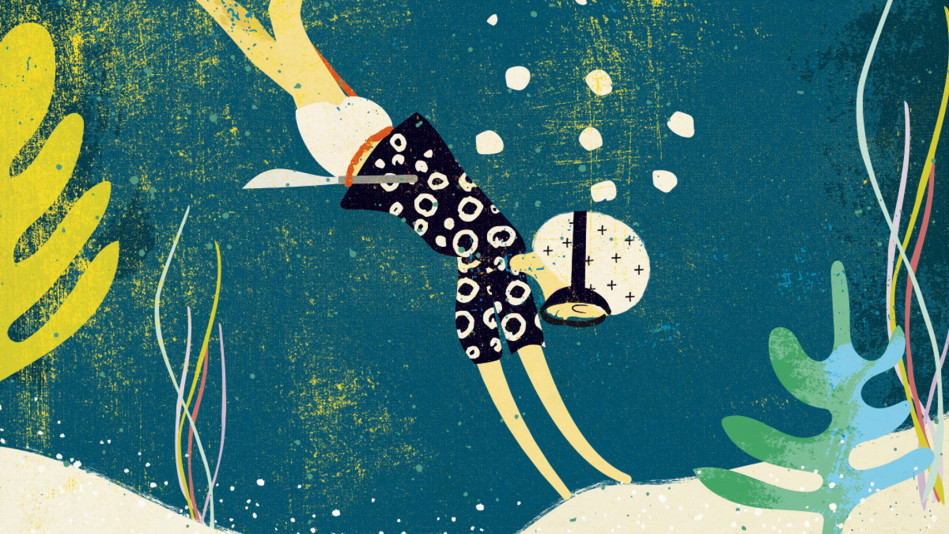What Japanese Ama Women Can Teach Us About Aging
Facing 50, adventure writer Holly Morris finds inspiration among intrepid elders.

Illustration: Andrew Bannecker
I've ridden swimming elephants in the Bay of Bengal, climbed the Matterhorn on a week's notice. In 20 years as an adventure writer, I've been fueled by the dopamine rush of pushing limits in remote places. But recently, at 49, though I loved thrill-seeking as much as ever, I'd begun making some unsettling calculations. Once I would have leaped into a camel race against Tuareg nomads; now I had to consider herniated discs. My mountain bike has been collecting dust since I broke my elbow in Romania last summer. Was my adrenaline-fueled high running on fumes? It seemed like a good time to go diving with the ama.
I'd read about the Japanese "women of the sea" decades ago while hatching a plan to escape my desk job. For thousands of years, they've been free diving—no scuba equipment or air tanks—into the frigid Pacific to harvest abalone, pearls, and shellfish. They plunge as deep as 30 feet in perilous dives and continue into their 80s, earning a good living doing a job they love.
My own creeping sense of mortality had reignited my curiosity about these hardy souls of a certain age, which is how I wound up off the coast of Japan's Mie Prefecture with ten divas of the deep. I'd heard this work had fallen to women because they have more body fat, which keeps them warm even in icy temperatures. But in the hut, as the divers pulled on sleek black wetsuits over sturdy bodies (in the old days, they dove wearing only loincloths), I asked, "Why no men?" One woman bellowed, "Ah, men are too weak!" Her friends howled.
Out on the water in our small boat, the women tightened their white headscarves—white supposedly wards off sharks—and whistled three times in the breathing technique they call isobue. When they submerged, powered only by the air in their lungs, I held my breath in solidarity. After two interminable minutes, they breached the surface, hands full of turban snails, clams, seaweed. No one struggled for air. Hiroko, 71, told me she was returning the next day to hunt for the elusive abalone. I worried about Tomiko, the frailest among them. I asked, "Are you okay?" She looked at me quizzically and nodded, as if it would never occur to her to be any other way.
The ama are now a disappearing culture, edged out by modern fishing and a dwindling marine population: Today there are around 2,000, down from about 18,000 less than a century ago. But as we warmed ourselves around a fire pit and shared stories, I realized the ama don't choose to keep going; they have to—it's in their blood. They told me about divers who'd worked until minutes before giving birth, of an elderly woman with a bad heart who kept joyfully plunging in until one day when she just never came back up. Their stories remind me that not knowing what's next, courting the unexpected—these are the hallmarks of my best self. This is no time to blink. I'm buoyed by the ama's fortitude and let it carry me out into the rough waters I know so well.
Want more stories like this delivered to your inbox? Sign up for the Oprah.com Spirit Newsletter!
I'd read about the Japanese "women of the sea" decades ago while hatching a plan to escape my desk job. For thousands of years, they've been free diving—no scuba equipment or air tanks—into the frigid Pacific to harvest abalone, pearls, and shellfish. They plunge as deep as 30 feet in perilous dives and continue into their 80s, earning a good living doing a job they love.
My own creeping sense of mortality had reignited my curiosity about these hardy souls of a certain age, which is how I wound up off the coast of Japan's Mie Prefecture with ten divas of the deep. I'd heard this work had fallen to women because they have more body fat, which keeps them warm even in icy temperatures. But in the hut, as the divers pulled on sleek black wetsuits over sturdy bodies (in the old days, they dove wearing only loincloths), I asked, "Why no men?" One woman bellowed, "Ah, men are too weak!" Her friends howled.
Out on the water in our small boat, the women tightened their white headscarves—white supposedly wards off sharks—and whistled three times in the breathing technique they call isobue. When they submerged, powered only by the air in their lungs, I held my breath in solidarity. After two interminable minutes, they breached the surface, hands full of turban snails, clams, seaweed. No one struggled for air. Hiroko, 71, told me she was returning the next day to hunt for the elusive abalone. I worried about Tomiko, the frailest among them. I asked, "Are you okay?" She looked at me quizzically and nodded, as if it would never occur to her to be any other way.
The ama are now a disappearing culture, edged out by modern fishing and a dwindling marine population: Today there are around 2,000, down from about 18,000 less than a century ago. But as we warmed ourselves around a fire pit and shared stories, I realized the ama don't choose to keep going; they have to—it's in their blood. They told me about divers who'd worked until minutes before giving birth, of an elderly woman with a bad heart who kept joyfully plunging in until one day when she just never came back up. Their stories remind me that not knowing what's next, courting the unexpected—these are the hallmarks of my best self. This is no time to blink. I'm buoyed by the ama's fortitude and let it carry me out into the rough waters I know so well.
Want more stories like this delivered to your inbox? Sign up for the Oprah.com Spirit Newsletter!



